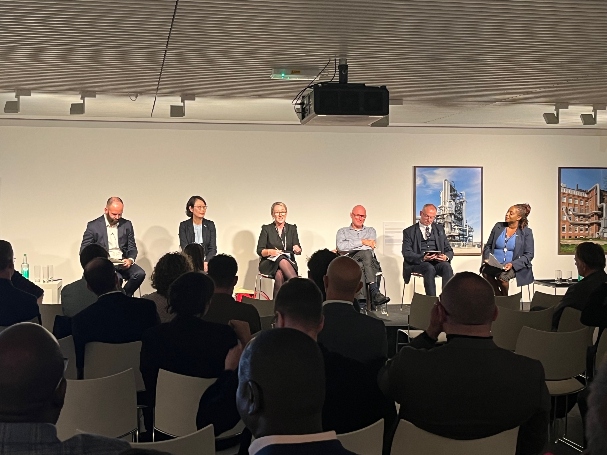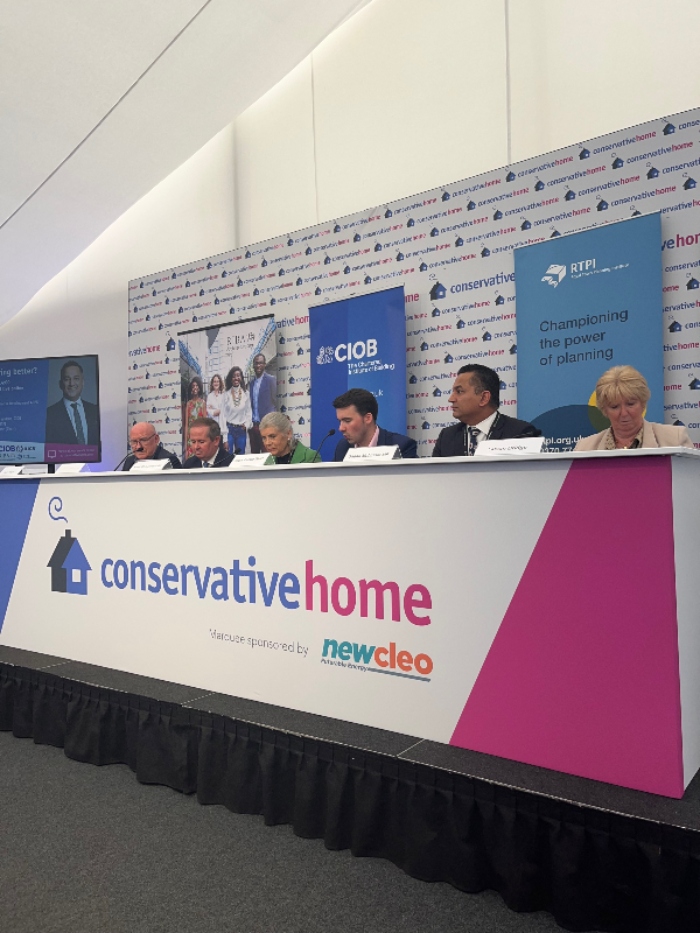Over the past two weeks, we joined the Labour Party Conference in Liverpool and the Conservative Party Conference in Birmingham. We hosted a panel event at both, in partnership with the Chartered Institute of Building (CIOB), the Royal Institution for Chartered Surveyors (RICS) and the Royal Town Planning Institute (RTPI).
It was an eventful two weeks with several new announcements and U-turns. Find out more below.
Labour Party Conference
The Labour Party announced a raft of sustainability-driven positions. Should they be elected, they would introduce a National Wealth Fund to invest in green projects and aim to achieve 100% clean energy and a zero carbon electricity system by 2030.
On social housing, the Labour Party announced they intend to restore ‘social housing to the second largest form of tenure’ through a rebuilding of social housing stock and bringing homes back into the ownership of local councils and communities.

RIBA event: What does sustainable development look like?
Chaired by RIBA’s Lifa Zvimbande, North West Regional Director at RIBA, the discussion featured contributions from RIBA President Simon Allford, Rebecca Long-Bailey, MP for Salford and Eccles, Paul Dennett Mayor of Salford, CIOB’s Craig Battye and Wei Yang from RTPI.
Maximising the longevity of developments can be achieved through retrofitting, improving infrastructure, and delivering quality, the panel suggested. The sustainability of the built environment ties closely to its legacy – meaning we must consider the long term nature of development not simply the work built environment professionals undertake.
The panel suggested that the current linear nature of the planning system is also problematic. Instead, we should move to a system that values feedback. This would incentivise greater design, which is crucial to sustainable development.
The discussion concluded with a consensus that greater headway needs to be made in the way of embedding and building sustainable development in our communities.
Watch the full event recording on our YouTube channel.
Conservative Party Conference
Addressing her first conference as Prime Minister, Liz Truss reiterated the party’s fiscal policies announced in the mini budget ten days earlier – committing to lowering the tax burden, reversing the increase in national insurance, and keeping corporation tax at 19%.
In response to increasing hostility from MPs and economists, Chancellor of the Exchequer, Kwasi Kwarteng announced the decision to scrap plans to abolish the 45% top rate of income tax. The plan, also announced in the recent mini budget, threw markets and mortgages into disarray.
How the UK could reach net zero was a clear theme throughout the conference. Positively, improving the energy efficiency of our housing stock was touted as a key solution by almost every panel attended.
Joining the conference virtually, new Department of Levelling Up, Housing and Communities Secretary of State, Simon Clarke re-committed to fixing the building safety system. He pledged to push on with pragmatic, common-sense reforms that facilitate an operable insurance industry.

RIBA event: Levelling up: building better?
Chaired by Angus Parsad-Wyatt of ConservativeHome, and joined by Gagan Mohindra MP, David Simmonds MP, Chair of the RIBA Board Jack Pringle, CIOB’s Sandi Rhys Jones OBE and Susan Bridge from RTPI - the panel addressed the question: Does levelling up equal building better?
The need for an effective National Retrofit Strategy was emphasised throughout the discussion, with panellists arguing that regenerating and levelling up are directly linked to improving our existing housing stock. Retrofitting homes not only reduces carbon emissions but will help address the cost of living crisis, through lower energy bills and improving health outcomes of building users.
Reforms to the planning system were also discussed. Panellists raised concerns about the current disorganisation of the decision-making process within the planning system. Greater consolidation would guarantee more efficient and productive output.
The benefits of Post Occupancy Evaluation (POE) were also highlighted. Reviewing a project once it is completed and occupied, provides invaluable feedback and insight for designers to take forward into future projects. Panellists suggested both government and industry should embed POE in all projects to deliver the quality buildings both people and the planet deserves.
Watch the live stream recording.
RIBA continues to work with MPs from across the political spectrum to highlight the value of architects in delivering sustainable, high quality developments that benefit local communities.









